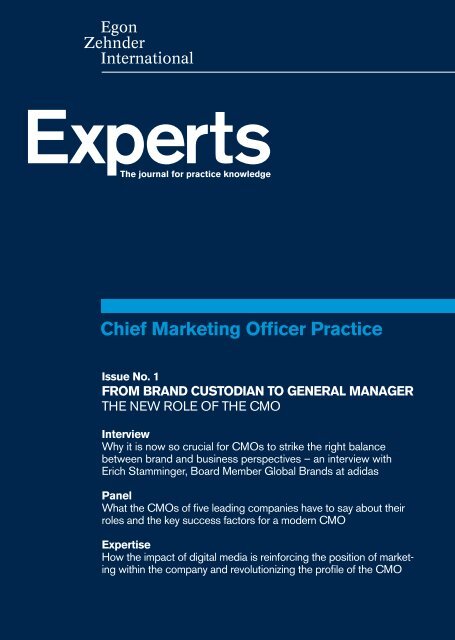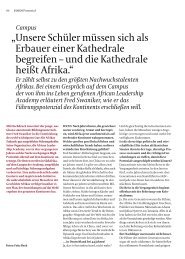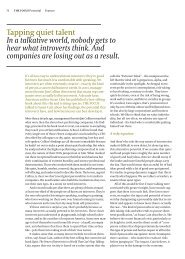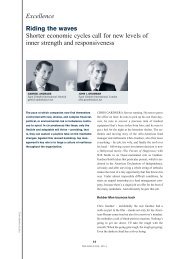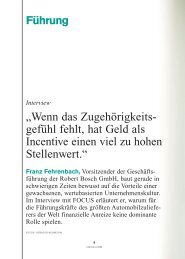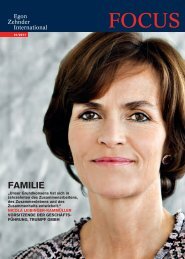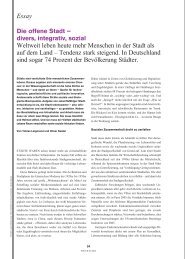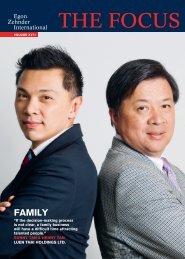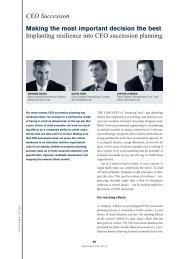Chief Marketing Officer Practice - Egon Zehnder International
Chief Marketing Officer Practice - Egon Zehnder International
Chief Marketing Officer Practice - Egon Zehnder International
You also want an ePaper? Increase the reach of your titles
YUMPU automatically turns print PDFs into web optimized ePapers that Google loves.
<strong>Egon</strong><strong>Zehnder</strong><strong>International</strong>ExpertsThe journal for practice knowledge<strong>Chief</strong> <strong>Marketing</strong> <strong>Officer</strong> <strong>Practice</strong>Issue No. 1FROM BRAND CUSTODIAN TO GENERAL MANAGERTHE NEW ROLE OF THE CMOInterviewWhy it is now so crucial for CMOs to strike the right balancebetween brand and business perspectives – an interview withErich Stamminger, Board Member Global Brands at adidasPanelWhat the CMOs of five leading companies have to say about theirroles and the key success factors for a modern CMOExpertiseHow the impact of digital media is reinforcing the position of marketingwithin the company and revolutionizing the profile of the CMO
Publisher<strong>Egon</strong> <strong>Zehnder</strong> <strong>International</strong> AGExecutive editorsMichael M. Meier, Dick PattonProject managerMarkus SchulerProductionMAC StudiosDüsseldorfEditingMona DirnfellnerEnglish language editingPaul BoothroydPrinted byDr. Cantz’sche DruckereiZeppelinstraße 29-3173760 Ostfildern, Germany<strong>Egon</strong> <strong>Zehnder</strong> <strong>International</strong> GmbHRheinallee 9740545 Düsseldorf, GermanyTel.: +49 (0) 211 55 02 85-40Fax: +49 (0) 211 55 02 85-50Email: corporate.communications@ezi.netWeb: www.egonzehnder.com© 2011 <strong>Egon</strong> <strong>Zehnder</strong> <strong>International</strong> AG
EDITORIALThe new role of the CMOWe are currently witnessing a global trend that is redefining the map references to whichcompanies refer for strategic direction: driven by the rapid advance of digital media, a sharpfocus on the customer and consumer is emerging as the new linchpin of corporate strategy.As a result, the marketing function is becoming a crucial success factor and the role of <strong>Chief</strong><strong>Marketing</strong> <strong>Officer</strong> is undergoing fundamental transformation. The former brand custodianis fast becoming a general manager who launches and drives a market-oriented managementapproach. Already well advanced in the consumer goods sector, this trend is now embracingother industries as well.In this issue of Experts we aim to provide you with valuable information about this transformation.In our interview with Erich Stamminger you will discover what the Board MemberGlobal Brands at adidas considers the key success factors in his career and what he believesmakes for a successful CMO in today’s market environment. You will also learn about thechanges that the experts at our CMO <strong>Practice</strong> have been witnessing and why, as a result,the competency profiles of CMOs and CEOs are progressively converging. And finally, ourpanel contributors from five leading companies in different industries and geographies providea first-hand impression of how the profile of the CMO has changed over recent years.We hope you find that the articles in this issue make inspiring reading. If you would like toknow more or discuss aspects of this topic concerning your own company, the experts fromour CMO <strong>Practice</strong> are at your disposal.The <strong>Chief</strong> <strong>Marketing</strong> <strong>Officer</strong> <strong>Practice</strong><strong>Egon</strong> <strong>Zehnder</strong> <strong>International</strong>The new role of the CMO Experts1
InterviewErich StammingerBoard Member Global Brands, adidas“Ultimately, it all boilsdown to running a business.”Erich Stamminger, Executive Board Memberresponsible for Global Brands at adidas AG,talks about how he built his career and thecompetencies today’s marketers need to makeit to the top.Photos: Michael Herdlein2 Experts The new role of the CMO
InTErvIEwEXPErTS: Tell us about the status of marketingat adidas – is it as pivotal as an outsidermight assume?Erich Stamminger: <strong>Marketing</strong> does play a crucialrole, because at adidas it’s the brand that drives thecompany. Whatever we do, the brand points the way.For example, in our medium-term plan launched inNovember 2010 we derived all our objectives andmeasures from the brands, taking into accountthe individual positioning of each brand as wellas its position in the brand matrix. Right now we’reworking on aligning adidas with Reebok, positioningboth brands in a way that allows us to reach abroader consumer base while avoiding contradictionsbetween the brands. Then we will fight to gainground in the market.In light of strong brands and driving them forward,how has the role of <strong>Chief</strong> <strong>Marketing</strong> <strong>Officer</strong>evolved over time?Before we look at the CMO we should first definewhat marketing is. Many people think marketingmeans communication. In fact, while communicationis a key factor, for adidas marketing includesmuch more. It’s about innovation and product development.And it includes business responsibility. Soat adidas it’s not only the CMO but also the marketingofficers reporting to him who assume productand business responsibility. <strong>Marketing</strong> is not isolated.It does not mean people sitting in an ivory tower,brainstorming about medium- and long-term strategies.It focuses on brand, creativity and innovationon the one hand, and on setting and achieving businessobjectives on the other.That’s an embracing and integrative take onmarketing…Yes, the key point is that marketing must not be isolatedif you want to be successful. You need thecommunication, innovation and creativity part aswell as the business part. Marketers have to be onpar with business people.So how has adidas evolved to the point whereyour role as Head of Global Brands is so broadthat it has such influence over the company?I would say it’s all part of having a great CEO. Therehas always been a close relationship between our<strong>Chief</strong> Executive Herbert Hainer and myself. Hestrongly supports the notion of the vital importanceof the brand. For him, the brand is the key driver ofsuccess, not only in the medium term but in the longterm as well. If you just focus on the P&L scheduledfor the next quarter – an essential indicator whenyou have to deliver short-term results for shareholders– you will miss the opportunities in the medium4 Experts The new role of the CMO
InTErvIEwand long-term. With a CEO focused on the shortterm you can present even the most promising idea,and he will say sorry, we cannot finance this.Herbert Hainer’s view, by contrast, is that “We don’tsee marketing as a cost driver, we see it as an investmentin the future.” He has supported me a lot andallowed me great freedom. We’ve always agreed onthe need to do something that leads us into the futureand not just keep on doing what everyone hasseen the brand do for the past five or ten years.what would you say are key success factors inmarketing the adidas brand?First and foremost, you need the right people. In myorganization there are two kinds of marketers: thosewho come up with creative ideas and are confidentthey can put them into practice, and those whoregard themselves the guardians of the brand. Bothare important. It’s the right mix that makes thedifference. Because on the one hand you need tomake sure everything you do is in line with thebrand’s authenticity and history. On the other handyou must not cling to heritage. You have to stick toyour understanding of the brand but project it into afuture environment. So the key success factor is tobring these two perspectives together, allowing bothkinds of marketers to have their say. A secondimportant factor is innovation. You have to be innovativeall of the time. In 2000 we committed tolaunching one completely new innovation or at leastone significant evolution of an idea every year. Ithink we have overachieved this by far. In the lastten years we have definitely been the most innovativecompany and brand in our industry.How do you define innovation?By innovation I don’t just mean product innovations.In our industry it’s not just about a new technologyfor a sole, a new upper or a new use of the laces toimprove the fit. Innovation also refers to how we dobusiness and how we connect with the consumer. Forexample, during the 2006 World Cup we ran a spectacularad campaign with the German goalkeeperOliver Kahn as brand ambassador. We also built the“adidas World of Football”, a stadium for publicviewing in Berlin opposite the Reichstag – it wasgiven wide coverage in the print media. Four yearslater, when we went to South Africa for the 2010World Cup, we knew that spectacular actions likethat would not work there. And we were determined“In the last ten yearswe have definitely beenthe most innovativecompany and brand inour industry.”The new role of the CMOExperts5
InTErvIEwto make our mark on the country. So we decided tocommit to social programs in the townships. We alsohelped fund the construction of a stadium in a township,and we produced a giant jersey that thousandsof South Africans signed over time and that we ultimatelydonated to the Nelson Mandela Foundation.One of the first things you said was: “Thebrand drives the company.” But what drivesthe brand?In our vision for the adidas brand it says: “Our passionfor sports makes the world a better place” – andwe’re out to transform that vision into reality. So toanswer your question, it’s this vision that motivatesus. That’s what drives the brand. If you take a walkaround the company and stop by at our stripesrestaurant, for example, you will find many peoplethere who are passionate about sports. And if youlook around at universities and talk about brandsand companies, you will find many people therewho are passionate about the three stripes. So thepeople drive the brand, and the brand in turn createstheir passion. It’s a virtuous circle, with emotionand passion as the key elements.vITAErICH STAMMInGErErich Stamminger is a Member of the ExecutiveBoard of adidas AG, where he has beenresponsible for Global Brands since 2009. Priorto that he was President of the adidas brandand was responsible for Global <strong>Marketing</strong>.Stamminger has been with the company for28 years, primarily in marketing roles. Togetherwith Herbert Hainer in 1991 he was appointedManaging Director adidas Germany and sincethen the two have worked side by side. whenHainer became CEO at the end of 2000, Stammingertook up a board level appointment as<strong>Chief</strong> <strong>Marketing</strong> <strong>Officer</strong> for the adidas brand.In 2004 he also became President of adidasAmerica.Under Stamminger’s leadership the adidasbrand has celebrated a worldwide string ofsuccesses in recent years. At present he is focusedon realigning the relative positioning ofthe reebok and adidas brands.what about when you look outside thecompany? which external factors drive yourbrand or product development – includingcompetitors?First of all we keep an open mind about all marketdevelopments that concern the young generation, the14 to 18-year-old kids. We think in a four-year lifecycle:Four years from now nobody will talk aboutwhat is cool today. This is an issue not only in ourindustry but far beyond, especially when it comes tothe social media and the way kids all over the worldare using communication tools. In future, the 600 or700 million young people around the globe will havemore and more in common as they are globally connectedvia the social media. This gives us a growinginfluence. Then there are changes in fashion design– these are important for us, too. Our designers travelto many places all over the world to get their inspirationbefore they start work on a new range. Basedon this inspiration they develop the outlines for theseasons to come. What about the competition? Well,I certainly don’t believe that watching the competitionand trying to outpace them is the fast track tomarket leadership. It is more important for us to defineour own path to the future, to be self-confident6 Experts The new role of the CMO
InTErvIEwand to trust in our people. We do keep an eye on thecompetition, of course, to make sure we keep trackof the big picture. But we would definitely not followthem. We want to be different and do things our ownway. That’s a matter of principle.Looking back at your career at adidas, whatwould you say have been the most importantfactors in your personal and professionalsuccess?First, I like this brand a lot; I have had an emotionaltie with it from the beginning. I think this is the keyfactor. It is important that you “feel something” foryour brand; that you identify with it and share thevalues it stands for. Only then will you convey acredible message. Second, there have always beenpeople in this company who supported me. Theyhelped me develop and gave me the freedom to trynew things. It is crucial that you should feel safe inyour professional environment. Because then youcan afford to take a decision or adopt a newapproach that looks promising but might provewrong. And third, I have always managed to balancethe brand view and the business view. Ultimately,it all boils down to running a business: Youmay be enthusiastic about your new product idea,but if the customer shows you he doesn’t like it, youwill have to find a way to deal with this. And whileyou may think it would be good to spend another100 million on the brand, you will perhaps not beable to do so, because your shareholders expectshort-term results as well. At adidas I think we havegot this brand/business balance just right.what considerations are paramount as youbuild your team and groom your successors?We make sure we have long-term employees whoknow and understand the brand, and at the sametime we recruit people from outside who bring infresh, new thinking. Some years ago we found outthat we could only rarely hire somebody at a higherlevel from one of our competitors, because our industryis pretty small. In fact, there is only one companywe really compete with. Conversely, only veryfew people have left our company and successfullyjoined a competitor. We also count on hiring andpromoting young talents from other – preferably“emotional” – industries because of their diversifiedexperience. We integrate them and develop them inour teams together with our own people.The new role of the CMOExperts7
InTErvIEwAre there specific areas of marketing for whichyou promote from inside and recruit from outside?Yes, there are. Let’s consider the different marketingfunctions: In the product field marketers needspecialized industry knowledge and also technicalknowledge. At adidas they need to understand howshoes are fabricated. This is not simple; you have toknow a lot about materials, production methods andcosts, as you have to cost the product up front. Thatis why, in this area, we invest more in our own youngpeople, preferring to educate them from scratch. Inother marketing functions, functions though, such ascommunications or digital, we definitely prefer professionalsfrom other industries, ideally from technicalcompanies. For instance, in this area we woulddefinitely hire someone from Apple, to name justone company. Another key requirement is that peopleunderstand and ideally also play sports. Becauseonly a sportsperson or at least a person interested insports will understand the emotions you experienceduring a football or basketball match, for instance.So you will find hardly anyone in our company whodoesn’t somehow bond with sports.what about specific competencies that youlook for in your new hires?Today, I’d say international experience is most important.It renders your thinking much more open.Intercultural openness is crucial at adidas. At thislocation, for instance, we have people of 50 differentnationalities. Open-mindedness helps us to learnfrom other people, which makes it very, very important.Then I always look at what someone does offthe job. Does he or she engage in any social projects,for example. This helps me to get a feel for theiropenness, which is essential for our company andour brand. In terms of knowledge, anyone who studiedbusiness, economics or marketing is going tomeet the requirements. However, if two candidateshave both have the same education, I look into theireyes and ask myself: Well, who has the fire, the passion,and the readiness to go the extra mile? That’swhat will tip the scale.It sounds like the crucial thing is cultural fit,which includes openness, working with diversecultures, a passion for the brand…Right. Technical skills are a matter of course; they8 Experts The new role of the CMO
InTErvIEwhave to be checked first. But on this basis, what I amlooking for in people is more about cultural fit.You mentioned digital media. How has thatchanged the way you communicate with theconsumer?It has transformed our way of communicating withthe consumer completely, not only in terms of newdigital media but also of television, print, outdoor media,and so on. To reach a broad consumer base weprimarily use platforms like Facebook, Twitter andYouTube that allow us to communicate directly withconsumers. And of course we keep a careful eye onwhat’s going on in chat rooms and forums. Media arechanging rapidly and I believe what we see today isonly the beginning. In the next three years we’ll seecommunication methods and tools arise that we don’thave a clue about today. This is where we want to beat the forefront, driving the changes as a pioneer inour industry, and even beyond. At the same time weknow that in future we will no longer need to create aTV ad campaign once a year, because – especially inour industry – it’s the young generation that influencesthe older ones. So in effect we address thesetarget groups through the digital channels too. This iswhy our digital department is set to grow.We have set up a department that takes care of everythingwe do in digital, in terms of communicationas well as customization, as we offer more and morecustomized products. This department is directlyresponsible to the head of brand marketing.How do you define success from a personalpoint of view and also in the context of adidas?There are quite different facets. The first is about P&L:You have a budget at your disposal and you don’t overspend;you invest your working capital and it works.You can see what you get back; you can measure thissuccess. The second facet is more difficult to explainbut equally important. For me it’s a success when Ihear people talk about adidas in a respectful way andsee that top designers all over the world as well as majorcar companies are eager to cooperate with adidas inone form or another. Similarly, when I enter an adidasstore and watch all those kids brimming over with enthusiasmfor our products, it’s just fantastic. I see allthis as an expression of high esteem or even “love” forthis brand. The third aspect of success is our employees’willingness to engage with new concepts andmove in new directions when we launch an innovation.It’s a success when people follow you just because theylove the brand and the company.If someone is looking to become a top marketer,what are the main assets to acquire andpitfalls to watch out for?There are four factors, I’d say – three assets and onepitfall: First, if you want get to the top you shouldhave lived abroad and run a business or a businessunit in a different culture. This provides you withdeeper insight not only into the business you areworking for, but also into diverse cultural environments.Second, you should have had P&L responsibility.It is important to know how challenging it canbe to bring an idea or a product to the consumer, takingaccount of the whole value chain, including thesupply chain. Third, you should stay in a function fora minimum of around three years to see if what youdid was successful. This gives you a chance to learnfrom experience and really understand the job beforeyou take up a new role. And finally, the pitfall: Don’trisk leaving your colleagues behind. Creative marketerstend to feel superior. They often speak a specificlanguage that others find difficult to understand.And they often move on too fast. You need tobe aware of this when you deal with other peoplewith different jobs and different views. Talk withthem as equals and make sure they can follow you.As George Bernard Shaw once said: “The greatestproblem in communication is the illusion that it hasbeen accomplished.”The interview with Erich Stamminger was conductedby Michael Meier, <strong>Egon</strong> <strong>Zehnder</strong> <strong>International</strong>Düsseldorf and Dick Patton, <strong>Egon</strong> <strong>Zehnder</strong> <strong>International</strong>Boston (left).The new role of the CMOExperts9
THE PANELFacets of changeAcross all sectors, the marketing function is increasinglyimportant to business management –and the role of the <strong>Chief</strong> <strong>Marketing</strong> <strong>Officer</strong> is growingaccordingly. On the following pages, five CMOsreport on how their jobs have changed in recentyears and what it takes to be a successful CMOtoday.10 Experts The new role of the CMO
Nina Bibby<strong>Chief</strong> <strong>Marketing</strong> <strong>Officer</strong>, Barclaycard“Helping people understand what we do as marketers is key.”How and why has your role as <strong>Chief</strong> <strong>Marketing</strong><strong>Officer</strong> evolved over the years?As I’ve had a number of different senior marketingroles I will give you my thoughts on the role of marketingacross sectors, which is dramatically different.In FMCG, the value-add of marketing is very apparentand lies in generating purchaser and end user demand,both new demand and ongoing usage. <strong>Marketing</strong>is the voice of the customer. Market success isequally driven by commercial decisions and marketing.So the role of marketing is very, very clear interms of impacting the business. As such, the role ofthe CMO in championing the customer and leadingthe development of the strategies, activities and tacticsto create and sustain demand is highly visible.Typically, in service businesses, marketing as a functionhas less sole ownership of the customer, becausethe business itself is serving customers. Managingthe ongoing customer experience can be as closely associatedwith sustaining demand as any traditionalmarketing activity. And management of the customerexperience is often within operations. So, marketing’srole is less clear and it is not as well understood. It canbe viewed simply as a communications function, veryexecutional. In the services sector, it is thus importantfor us to redefine the role of marketing. In many financialservices companies, marketing activities havenot typically included answering strategic questions,such as: How can we change our relationships withcustomers as distribution changes? So more time isspent working across the senior management team toembed an understanding of marketing’s role in thisnew environment. From a technical perspective, marketinghas more opportunities than ever to impact thecustomer, but leveraging these opportunities is complex.The CMO role is becoming more demanding asmore channels open up and interact with one another,competition for share of mind and share of walletheats up and customer sophistication increases.How do you create an impact on your organizationand what are the key success factors foryour role?I find that my role is often about influencing and explainingin simple and commercial terms to peoplewhat it is that we do as marketers and why it is important.Marketers traditionally use lots of lingo,which tends to get lost on people, and lay sole claimto the customer, which as I have said is not reallyvalid in service businesses. Often, people assume weare just about colours and cardboard. There is a fundamentaldisconnect in appreciating the rigour of themarketing discipline.I address this disconnect in a number of ways.Firstly, I try to find the burning platform whichmarketing can help address and focus on what arethe big strategic levers we can pull. How can weintegrate across traditional marketing disciplinesto make a step change impact on the business?Also, it’s key to keep things simple and leave thelingo behind when communicating. Quick wins arereally important to establishing credibility andhelping people understand what marketing is aboutso that we can extend our influence and impact.Finally, any large-scale brand programme requiresas much focus and planning on the internal roll-outas the external roll-out, because of the impact offrontline employees on delivering the service andtherefore the brand.What skills and experience does it take to makea successful CMO?I think of being good at my job in terms of the nontechnicalskills as well as the technical ones. Thetechnical skills are pretty obvious. From the nontechnicalstandpoint, influencing is paramount, as Ihave said. And a big part of influencing is listening.Confidence, especially in financial services, is vital,because this is a very tough, robust environment. Soa successful person needs to be able to stand theirground. Being analytical is important, as is understandingof the perceived role of marketing in servicesand that it is a journey to change perceptions.Most crucially, building and leading a team that haspride in the business and the capabilities to deliverreal value, in a highly collaborative way.The new role of the CMOExperts11
THE PANELJoseph Kumar GrossGlobal Head of Group Market Management, Allianz SE“The CMO drives the transformation into a more customer-orientedorganization.”How and why has your role as <strong>Chief</strong> <strong>Marketing</strong><strong>Officer</strong> evolved over the years?The fundamental change is that the role of <strong>Chief</strong><strong>Marketing</strong> <strong>Officer</strong> at Allianz has moved on from theoriginal primary responsibility, which was brandmanagement – establishing the strategic value propositionand then transferring that into insightful,powerful global branding and brand messages. Thisof course continues to be a key role for a CMO ofAllianz Group, but we are now well into the evolutionfrom branding responsibility into true marketing,or as we call it “Market Management Responsibility”,which is designed to transform and driveAllianz into a more customer/market-driven organization.That of course encompasses all areas of themarketing mix, from product pricing and distributionto customer-value management and of coursebranding; and because this is a new journey for theinsurance industry, it has transformed the role of theCMO into a key driver of the transformation of thecompany. As a Group CMO I don’t have direct businessP&L and customer responsibility. My job is ratherto make sure that this is enabled, and implemented atat the local country level. This involves the total portfolioof change management – from organization,processes and people, to contents and best practices.How do you create an impact on your organization,and what are the key success factors foryour role?My own role as CMO is more indirect. My metricsand success factors relate to implementing organizationalstructures and processes and enabling the businessimpact at local level. The Market Managementfunction includes having the right people in place,which means using HR metrics like target profilesand 360° feedback; that is one of my key success criteria.Then in the brand arena we have global brandperformancemetrics and efficiency metrics to measurethe success of our global branding. And finally, inthe “outputs of Market Management” as we call it, interms of customer-portfolio development etc. we haveindirect responsibility. Basically, we support the localentities in delivering customer impact. At local level,things are much more concrete. Typical metrics for alocal Head of Market Management or a CMO wouldbe total customer-count number, total high-valuecustomernumber and total customer value of theportfolio; so basically, it is not just about the quantitybut the quality of the customer portfolio.Then at the Sales level, Market Management has toprove its value in driving the GPW (gross premiumswritten) of Sales, via better marketing material,for instance, or by providing our agents with bettercustomer-lead lists. If you boil it down, what Salesis interested in is driving sales at lowest cost withstrong commission at a competitive price and a superiorservice also of the back-office. And if MarketManagement drives these performance areas, that iswhere the effectiveness is created and we get buy-infrom the Sales organization.What skills and experience does it take to makea successful CMO?Our experience shows that market managers whoperform best as CMOs in local entities have strongcollaborative and influencing skills. They stand outin leadership because they are able to get otherpeople to follow, even if they do not have the disciplinarypower. That takes people who are wellgrounded in the facts and figures of their operationswhile at the same time understanding and addressingthe needs of their partners.Further, I’d say results-orientation and change leadershipare two critical aspects. With results-orientationI’m thinking in terms of entrepreneurial spirit: gettingthings done; tangible actions that drive visible impact.In terms of change management, you need to be ableto deal with change in all of its complexities and all ofits challenges and barriers, be it culture, people, hierarchy,processes, or whatever. And again, the bestsuccess models are people and leaders who work andunderstand their colleagues, and don’t just try to pushthrough a dogmatic approach.12 Experts The new role of the CMO
THE PANELCarol KruseSenior Vice President, <strong>Marketing</strong>, ESPN“You have to establish a culture that embraces change.”How and why has your role as <strong>Chief</strong> <strong>Marketing</strong><strong>Officer</strong> evolved over the years?I’ve only been in this role for five months. However,I could share how I may be evolving this role in thecompany. I think that there is a sea change in hiringCMOs right now, especially in the media and contentbusinesses. There is a much stronger demand for peoplewith strong digital backgrounds, because that iswhere our consumers are spending a lot more of theirtime, in addition to watching TV. Marketers need toknow how to integrate mobile phones, tablets, gamingconsoles and social networks into their communicationsplans. So when ESPN did a search to look for anew CMO, two prime focus areas were on digital andon social. The CMO role is evolving from a primaryfocus on building brands and driving viewership toalso include key strategic questions such as: How doesESPN play in the social space? What is the role ofmobile? Authentication of unique content and whatother emerging new media areas should we be involvedin? That’s the evolving role of the CMO atESPN and, in my opinion, also at many media companiesand major content providers.How do you create an impact on your organizationand what are the key success factors foryour role?In the overall ESPN organization I am looking todrive greater integration between departments.Therefore we are tightening our collaboration withProgramming, Production and the Sales teams. AndI’m trying to make sure we have an equal seat at thetable when it comes to defining strategies. And then,I would say, we are frequently the voice of the fanand involved in making sure we offer a great fan experiencethat is aligned with our brand image andour brand values.Within my own team and my own marketing organizationI am also driving that same integration andmaking sure that the disparate parts of 150 people onmy team are integrated. To that end, in driving moreintegrated marketing plans and very integrated marketingteams, I have the opportunity to move ourentire marketing organization into a new building inNew York. And, instead of seating people in thisnew location with their functional teams, we aregoing to have people sitting next to each other whomay not work together on a day-to-day basis. Webelieve that will foster a lot more integration andfresh thinking.What skills and experience does it take to makea successful CMO?I think innovation and adaptability to change andbeing a change agent within your own organizationare critical. Consumer behavior – how consumersfind, consume, participate in, talk about and sharecontent – is changing fast. Often consumers arecontrolling the dialogue about your brand, and thereis a stage for them to do so. All those factors requireany C-executive to be innovative, to be open andlisten and watch behavior, to embrace and anticipatethat change, and to recognize that you can’t alwayscontrol the experience.Winning companies are those that not only adoptchange but actually anticipate and drive it. That iswhat is going to be really necessary. But you have toknow how to cascade that change down through theorganizations, through the people you hire and theway you structure your teams to establish a culturethat embraces change. In terms of culture it is reallyimportant that you get everyone on board, behind avision, behind perhaps a new way of working. Youalso need to get processes and routines in place thatare flexible and can adapt quickly to new scenarios.The key is creating an environment where your teamis not threatened by change, but instead embraces itand finds ways to optimize the opportunities changebrings.The new role of the CMOExperts13
THE PANELVibha Paul Rishi<strong>Chief</strong> <strong>Marketing</strong> <strong>Officer</strong>, Future Group India“Not nearly enough has been done in the area of digital media.”How and why has your role as <strong>Chief</strong> <strong>Marketing</strong><strong>Officer</strong> evolved over the years?I’m not sure the role of the CMO has changed, butthe reality that we’re faced with in India has changedvery significantly. What tends to change over time isthe depth of information available, as well as yourown development. You start to understand morelayers and nuances in an emerging market. To be asuccessful CMO you still need to be the custodian ofwhat the consumer wants and desires and how yourbrands fulfill such needs.As more data is generated you also need the abilityto pull back from data and use it to create an assortmentof ideas that are very strongly quantitativelyvalid as well. You don’t need to be a mathematicalgenius, but you do need the ability to have the numberstalk to you and to create enough distance fromthe numbers to make sense of them. As in the past,you need to be able to synthesize the quality with thequantity, but the complexity of what you are dealingwith has risen significantly.I’d also say that, while there has been a big change,not nearly enough of the entire marketing spend isgoing into the direct marketing through media suchas digital technology. When I say digital I don’t meanbanners on portals. First it’s about knowing yourcustomers and being able to deal with them directlyusing digital means with their permission. And thesecond point is digital as a medium, the way we usesocial media for actual sales and brand pitches.That’s another place that’s underinvested in. Andpart of the reason is that we are still not able to measureit as much as we would like to.How do you create an impact on your organization,and what are the key success factors foryour role?I think where the CMO’s role is important in anorganization is in making sure it’s not all about thelatest ad. As the custodian of the consumer’s voice,marketing needs to be reflected in every singleaspect of thinking across the organization. You bringthe customer’s voice to the shop floor, the trucks, thebusiness processes. From product development toprocess design, it’s the customer first. And indeed,at the Future Group, marketing thinking is centralacross all the retail formats.As the CMO you need to strike a balance; you’re notthe person on the absolute front line with the consumer.At the same time you mustn’t sink into beingan administrative head of a number of bodies. Soyou still need to be able to understand and empathizewith the people on the front line without necessarilyinterfering in what they are doing, and you must helpbuild their skills.What skills and experience does it take to makea successful CMO?You have to be open-minded and not get eithernumber-phobic or completely immersed in numbers.CMOs without an understanding of analytics willnot survive in the future, and no CMO, past orfuture, could survive without an understanding ofthe human condition.One view of the ideal path to CMO has been that weshould criss-cross between doing sales and morecommercial roles and doing marketing roles. I wouldadd a third factor to this: product development. Andthe more roles you play across the process of thecustomer experience, the more well-rounded youare. I think the key phrase is “critical experiences”.The more critical experiences you have, the moreyour mind opens, the better a human being in manyways you become, and the more open to ideas youbecome. And I think I would put a stint overseas inthat “critical experiences” category.Finally, I would add empathy to the list – the abilityto see through other people’s eyes – and the affectionthat one must have for one’s consumers. Those arenot things one can teach and they are very easy tostifle in an organization’s culture. This is a skill setnobody talks about, but it’s a skill set to nurture for astrong marketing group.14 Experts The new role of the CMO
THE PANELJames Thompson<strong>Chief</strong> <strong>Marketing</strong> <strong>Officer</strong>, APAC Diageo“It is increasingly the imagination of the CMO that makesthe difference.”How has your role as a <strong>Chief</strong> <strong>Marketing</strong> <strong>Officer</strong>evolved over the past few years and what arethe underlying reasons for that?In the past, the CMOs in many multinational companiesused to need to know about how to grow inNorth America and in parts of Western Europe, becausethat was where the business was. The idea wasthat you put whatever you had, globally or in Europe,into emerging markets like Asia and hoped it justcarried on growing. And that can’t happen anymore.The financial crisis has accelerated the need for organizationsto shift their focus away from the NorthAtlantic and more to the South Atlantic and the Pacific,and in some cases to Africa as well. Those arethe places that are going to account for probablymore than 50 percent of many multinationals’ growthin the next five to ten years. What a CMO needs todayis to understand what drives growth hardest inthose places, rather than seeing that as the icing onthe cake. This is a total shift in emphasis.How do you create an impact on your organisationand what are the key success factors foryour role?The CMO always used to be the best at their craft.The basics stayed the same – a TV ad has lookedmuch the same since 1950; they just added color or3D. So the CMO used to be somebody who, throughtheir experience, was very good at their job and wasable to coach junior people through the organization.Nowadays, it’s the people who interact with consumersin real time who know far more about what isright. It is no longer just about being the craft expertwho coaches people; it is also about being good atrecognizing the people who have their finger on thepulse of the market, even if you don’t fully understandwhat they are doing. It’s about making surethat the right people are on the bus and developingthe people on the bus. And while that has alwaysbeen true, what is different now is the need to recognizethat they may know more than you. What is importantis being able to spot that and to know whosejudgment to trust and who to back.What skills and experience does it take to makea successful CMO?A CMO needs to be able to lead by intuition; to understandat an intuitive level and not just at a spreadsheetlevel. There is so much data in the world and solittle information, and it is very hard to distill downeverything that is going on, particularly in emergingmarkets. Detailed analyses of trends and market performanceare still important, but knowing what hasjust happened does not tell you what is going to happen.So the CMO needs a far more powerful sense ofvision and almost bloody-mindedness in pursuingthat vision and leading people towards it. You needmaverick leaders now in marketing organizations,people who are prepared to step out almost in entrepreneurialfashion, and say: This is where we have togo. The second key skill is the ability to bring anorganization with you – the ability to rally differentfunctions around your banner. And the third one isto be able to make that mental intuitive leap that otherscannot. It is increasingly the imagination of theCMO that makes the difference.Careers are often built by doing bigger and bigger jobsin bigger organizations. That is good and right; butsometimes people need to take smaller jobs in smallerfirms where they develop more of an entrepreneurialfeel. The value of going to a small business for a whileis to get used to speed of decision-making being themost important thing, based on less data. Alongsidethe big corporate disciplines, that skill is going to beincreasingly important for a CMO. While in traditionalcareers the best people would end up in the biggestbusinesses, today the best people need to end upin the emerging businesses. If you want to get on inyour career, you need to have been to one of theseplaces. If you want to grow your brand, you need tostart from the sensibility of somebody in São Paolo orShanghai, rather than London or New York.The new role of the CMOExperts15
expertiseFrom Brand Custodian toGeneral ManagerIn the age of digital media where the power of brandsof all sizes has been democratized, customer focus hasbecome a strategic imperative for every company. Thishas strengthened the role of marketing and revolutionizedthe profile of the <strong>Chief</strong> <strong>Marketing</strong> <strong>Officer</strong>. The onetimecustodians of the brand have been transformedinto generalists with strong business management skills.Illustration: Nick Lowndes/eastwing16 Experts The new role of the CMO
DiCK pATTON<strong>Egon</strong> <strong>Zehnder</strong> <strong>International</strong>, Bostondick.patton@ezi.netMiCHAEL M. MEiEr<strong>Egon</strong> <strong>Zehnder</strong> <strong>International</strong>, Düsseldorfmichael.meier@ezi.netDigital deluge, destruction and development<strong>Marketing</strong> has changed radically in recentyears – and the transformation is not yet complete.if you ask – as we did – cMOs of large internationalcorporations about their roles and responsibilities,they reveal the wide scope and complexity thatthis position carries today. in a growing number offirms, marketing acts as the voice of the customer,initiating, enabling and driving market-orientedcorporate governance. this often means that underits direction, processes and structures undergo afull-scale realignment.as it has moved to center stage, marketing haschanged from the ground up. From a single, limitedfunction that dealt primarily with communicationand creativity, it has grown into a multifacetedfield that integrates a variety of functions and hasa material influence on the strategy and organizationof the company. <strong>Marketing</strong> is becoming a drivingforce within the company. this has also meantredefining the role of the cMO, which is expandingto include responsibilities and powers similarto those of a general manager. in many consumergoods companies, this understanding of marketingand the role of the cMO already dominates; inother sectors, it applies to an increasing degree.Without a doubt the primary engine of thischange can be found in the digital media, whichare developing at a rapid pace – with tangible results.in the consumer goods sector, many retailbusinesses are competing for a larger share of theonline market. at the same time, completely newproducts and services are being created by the convergenceof formerly separate technologies such asinternet, television and telecommunications. newmarkets are developing. thanks to blogs and socialnetworks such as twitter, Youtube and Facebook,the virtual world also influences real life. consumersuse communications and media differently;new consumption patterns and lifestyles are created.digital media give consumers unprecedentedinfluence. the internet has become an assessmenttool for purchases, as new instruments and platformsare constantly developed to allow consumersto do research and share opinions before they buy aproduct. People are taking increasing advantage of“virtual” options for participation and control. thepower of the consumer is growing.Direct to the consumerthis has wide-sweeping implications for companies.the digital revolution has affected every industry.Barriers to entry, such as capital-intensivedistribution models, are being swept away. in mostconsumer goods sectors, profits are under pressurebecause people are choosing to buy products online.We need only to look at amazon to see thedimensions of this change: in the United states theonline store now accounts for almost 20 percent ofthe total sales of the 500 largest retail businesses.it is hardly remarkable that consumer goods manufacturerswho previously distributed their productsthrough retail channels are now looking for waysto approach the consumer directly. as part of thisgrowing worldwide trend, many now completelycircumvent retail stores or, like apple, use themprimarily to present their brand world.With the growing influence of e-commerce andonline and mobile communication, there has alsobeen a change in the relationship between companyand consumer. the company’s view of their businesshas taken a 180-degree turn. instead of takingthe product as their starting point, they now have tobegin with the person who buys the product. theconsumer’s current preferences and needs have becomethe measure of all things. this has boosted theThe new role of the CMOExperts17
ExpErTisEin leading companies CMOs are involved – or ideally,instrumental – in developing the overarching corporatestrategy.strategic importance of digital marketing, which isdriving the transformation of the company into aconsumer-oriented organization. all the more sobecause this has proven the best way to reach youngconsumers, an elusive yet highly influential group.almost incidentally, digital media also serve asan important resource for sharpening customer focus– they are the source of copious and often highlydifferentiated market and consumer data that allowcompanies to measure marketing success. theyprovide information from around the world, 24/7and at a minimal cost. analyzing and applying thisdata effectively, however, requires skill and experience.Many companies have put together specialonline teams and appointed marketing managerswho are experts in the field of digital media.But companies need to go a step further to makeoptimal use of the data that comes in every hourof every day. actions must follow on the heels ofinformation, meaning decisions have to be mademore rapidly than ever before. this requires flatterorganizational structures and good teamwork, especiallyacross the boundaries of departments anddivisions. cooperation and partnerships – insideand outside the company – are important determinersof success today. companies that hold protractedcoordination meetings on several hierarchicallevels risk being trumped by the competition.New marketing opportunities, new competencesall this has created numerous challenges andcaused an upheaval in marketing departments thatcan be characterized as epochal. On the one hand,models that were successful for decades have becomeobsolete; as customer contacts become increasinglyindividualized, mass communicationsand standard sales formulas are flopping. On theother, interactive media shaped by users – such asblogs and social networking groups – are openingup completely new marketing opportunities. thereare also hurdles to overcome, however. <strong>Marketing</strong>must succeed in becoming relevant for media usersand insert itself into the flow of digital communicationswithout appearing heavy-handed or inauthentic.against this backdrop, today many companiesare rethinking their marketing activities.Long-term investments in the brand, communicationstrategies, commercial relationships on differentchannels, the depth and breadth of the productportfolio – all are being reexamined.as the company’s strategic focus turns to thecustomer, new and increasingly complex responsibilitiesare falling under the purview of marketing.creative and operational tasks take a back seat asconceptual demands grow. in growing numbers ofcompanies, the board requires marketing to have aclear strategic orientation while taking on responsibilityfor sales and profits. at the same time, marketingmanagers are also finding it increasinglydifficult to balance long-term strategic goals withthe need to achieve short-term economic success.The new CMOaround the world, we can currently observe howdeeply this has changed the profile of cMOs. inleading companies they have long since movedaway from the role of brand custodian, insteadmanaging a wide spectrum of often highly complexresponsibilities. they are involved – or ideally, instrumental– in developing the overarching corporatestrategy. it is also their job to ensure that theircompany has a strategically oriented customer focus.this includes bringing departments on board,bridging their differences, and initiating and directingchange processes. in many points, the responsibilitiesof the “new” cMO overlap with thoseof other divisions such as it, sales, r&d and eventouch on process organization. close coordinationis required by cMOs to push forward with a comprehensiveproduct marketing plan that centers onconsumer requirements – from idea to productionand distribution. the success of their activities ismonitored using kPis that could also serve as generalindicators of the company’s success.18 Experts The new role of the CMO
ExpErTisEOutstanding CMOsOutstanding CEOs7.05.05.04.84.94.54.04.9 4.64.24.44.34.54.14.14.04.64.44.33.53.01.0resultsorientationTeamleadershipCollaborationandinfluencingstrategicorientationOrganizationaldevelopmentChangemanagementCustomerorientationMarketknowledgeCompetenciesgiven the type and scope of these responsibilities,it is natural to conclude that nowadays the competenceprofile of a successful cMO is similar to thatof a ceO. and indeed, an analysis of anonymizeddata from management evaluations conducted byegon <strong>Zehnder</strong> international revealed significantoverlap. in large portions of the performance assessmentwith eight defined competences, therewere few differences between cMOs and ceOs.this shows that cMOs are just as results-orientedas ceOs and have equally well-developed competencesin teamwork, organizational development,change management and market expertise.What does this tell us? although some still believethat cMOs don’t have what it takes to be ceObecause they have a narrow perspective and are notsufficiently results-oriented, this view is clearlyoutdated. the striking similarities in competenceprofiles leave no doubt that today’s stellar cMOstake on large-scale responsibilities requiring businessmanagement expertise. given the trend towardsincreased customer focus, this competencyprofile will apply to even more marketing managersgoing forward and ultimately will serve as thebenchmark for successful marketing executives. inthe future those who want to succeed as cMOs willhave to possess the wide-ranging skills of a generalmanager, and be more than comfortable withdigital media and the accompanying challenges.this is good news for successful cMOs who areconsidering making the move to ceO. they can becertain that they are already well equipped to meetthe demands of the position to which they aspire.THE AUTHOrsDr. MiCHAEL MEiEr is a consultant in theDüsseldorf office of <strong>Egon</strong> <strong>Zehnder</strong> international.He works in the Consumer practiceGroup. His clients include companies from theconsumer goods sector, as well as from tradeand industry. He also advises numerous midsizeand family firms.DiCK pATTON is a consultant in the Bostonoffice of <strong>Egon</strong> <strong>Zehnder</strong> international. Dick focuseson consumer companies, including consumerproducts, consumer media, hospitalityand services. He also consults with boards ofdirectors.Together they lead the global <strong>Chief</strong> <strong>Marketing</strong><strong>Officer</strong> practice.The new role of the CMOExperts19
CHIEF MARKETING OFFICER PRACTICE LEADERSHIPDick PattonBOSTONCo-Head, <strong>Chief</strong> <strong>Marketing</strong><strong>Officer</strong> <strong>Practice</strong><strong>Egon</strong> <strong>Zehnder</strong> <strong>International</strong> Inc.45 Milk Street, 4th FloorBoston, MA, 02109USATelephone +1 617 535 3500Telefax +1 617 457 4949Email dick.patton@ezi.netMichael MeierDÜSSELDORFCo-Head, <strong>Chief</strong> <strong>Marketing</strong><strong>Officer</strong> <strong>Practice</strong><strong>Egon</strong> <strong>Zehnder</strong> <strong>International</strong> GmbHKönigsallee 5540212 DüsseldorfGermanyTelephone +49 211 13 999 22Telefax +49 211 13 999 31Email michael.meier@ezi.net20 ExpertsThe new role of the CMO
EGON ZEHNDER INTERNATIONAL – OFFICES WORLDWIDEAMSTERDAM Telephone +31 20 30 11 11 1ATHENS Telephone +30 21 06 83 33 33ATLANTA Telephone +1 4 04 83 62 80 0BANGALORE Telephone +91 80 4334 9000BARCELONA Telephone +34 93 24 05 13 5BEIJING Telephone +86 10 58 12 73 00BERLIN Telephone +49 30 32 79 55 0BOGOTA Telephone +57 13 12 04 16BOSTON Telephone +1 617 53 53 50 0BRUSSELS Telephone +32 26 48 00 83BUDAPEST Telephone +36 14 74 97 40BUENOS AIRES Telephone +54 11 48 14 50 90CALGARY Telephone +1 403 71 83 70 0CHICAGO Telephone +1 312 26 08 80 0COPENHAGEN Telephone +45 33 11 13 53DALLAS Telephone +1 972 72 85 91 0DUBAI Telephone +971 43 81 02 00DUSSELDORF Telephone +49 21 11 39 99 0FRANKFURT Telephone +49 69 63 39 60GENEVA Telephone +41 22 84 96 86 8HAMBURG Telephone +49 40 32 32 40 0HELSINKI Telephone +358 96 84 00 30HONG KONG Telephone +85 22 52 56 34 0HOUSTON Telephone +1 713 33 16 70 0ISTANBUL Telephone +90 21 22 36 73 93JAKARTA Telephone +62 21 57 97 34 68JEDDAH Telephone +971 43 81 02 00KUALA LUMPUR Telephone +60 32 16 48 29 9LISBON Telephone +35 12 13 51 06 60LONDON Telephone +44 20 74 93 38 82LOS ANGELES Telephone +1 213 33 71 50 0LYON Telephone +33 47 24 11 85 0MADRID Telephone +34 91 52 14 11 5MELBOURNE Telephone +61 39 67 89 60 0MEXICO Telephone +52 55 55 40 76 35MIAMI Telephone +1 305 56 91 00 0MILAN Telephone +39 02 86 96 21MONTREAL Telephone +15 14 87 64 24 9MOSCOW Telephone +7 495 91 65 43 8MUMBAI Telephone +91 22 40 76 70 00MUNICH Telephone +49 89 29 00 69 0NEW DELHI Telephone +91 12 44 63 80 00NEW YORK Telephone +1 212 51 96 00 0PALO ALTO Telephone +1 650 84 73 00 0PARIS Telephone +33 14 43 18 10 0PRAGUE Telephone +42 02 21 11 17 34RIO DE JANEIRO Telephone +55 21 22 11 22 50ROME Telephone +39 06 85 37 37 1SAN FRANCISCO Telephone +1 415 96 38 50 0SANTIAGO Telephone +56 29 24 77 00SAO PAULO Telephone +55 11 30 39 07 00SEOUL Telephone +82 23 70 68 10 0SHANGHAI Telephone +86 21 24 01 82 00SINGAPORE Telephone +65 62 25 03 55STUTTGART Telephone +49 71 12 73 00 60SYDNEY Telephone +61 29 24 04 50 0TEL AVIV Telephone +972 52 60 18 20 1TOKYO Telephone +81 35 21 90 45 0TORONTO Telephone +1 416 36 40 22 2VIENNA Telephone +43 15 31 72 0WARSAW Telephone +48 22 53 77 41 0ZURICH Telephone +41 44 26 76 96 9LUXEMBOURG Telephone +32 26 48 00 83The new role of the CMOExperts21


